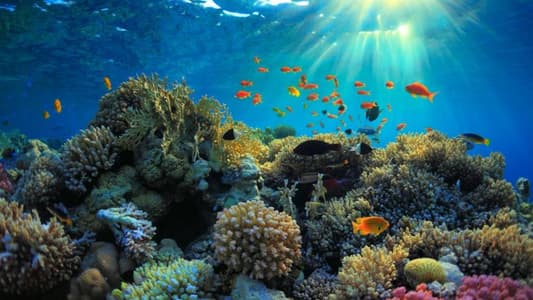Dead patches on Australia's Great Barrier Reef could be revived by playing the ambient sounds of a healthy reef via loudspeakers to lure in young fish.
These fish help to clean the reef and make room in which new corals can grow, beginning the process of ecosystem recovery.
Increasingly frequent marine heatwaves have been creating dead patches in the barrier reef by 'bleaching', in which corals are forced to expel their symbiotic algae.
Marine biologist Tim Gordon of the University of Exeter and colleagues set up submarine loudspeakers in patches of dead coral around Lizard Island on Australia's recently devastated Great Barrier Reef.
These speakers played recordings of the sounds of a healthy reef - including the noises made my shoals of fish, shrimps, and other reef dwellers.
The researchers found that twice as many fish arrived at - and stayed near - the dead patches where the loudspeakers were operating than those where no sound was playing.
'Fish are crucial for coral reefs to function as healthy ecosystems,' said Mr Gordon.
'Boosting fish populations in this way could help to kick-start natural recovery processes, counteracting the damage we're seeing on many coral reefs around the world.'
The new technique works by reproducing the sounds that are lost when reefs are quietened by degradation, the researchers explained.
'Healthy coral reefs are remarkably noisy places - the crackle of snapping shrimp and the whoops and grunts of fish combine to form a dazzling biological soundscape,' said paper author and fellow Exeter marine biologist Steve Simpson.
'Juvenile fish home in on these sounds when they're looking for a place to settle.'
'Reefs become ghostly quiet when they are degraded - as the shrimps and fish disappear - but by using loudspeakers to restore this lost soundscape, we can attract young fish back again.'
'Of course, attracting fish to a dead reef won't bring it back to life automatically, but recovery is underpinned by fish that clean the reef and create space for corals to regrow,' added biologist Mark Meekan of the Australian Institute of Marine Science.
The team found that broadcasting healthy reef sounds doubled the total number of fish arriving onto experimental patches of reef habitat and in doing so increased the number of species present by 50 per cent.
This increased diversity included species from all sections of the food web - including plant-eaters, plankton-eaters, fish-eating predators and creatures that feast on decomposing plant and animal matters.
Different species of fish provide different functions on coral reefs, meaning that an abundant and diverse fish population is important for maintaining a healthy ecosystem.
'Acoustic enrichment is a promising technique for management on a local basis,' said.
'If combined with habitat restoration and other conservation measures, rebuilding fish communities in this manner might accelerate ecosystem recovery.'
'However, we still need to tackle a host of other threats including climate change, overfishing and water pollution in order to protect these fragile ecosystems.'
'Whilst attracting more fish won't save coral reefs on its own, new techniques like this give us more tools in the fight to save these precious and vulnerable ecosystems,' added Mr Gordon.
'From local management innovations to international political action, we need meaningful progress at all levels to paint a better future for reefs worldwide.'
The full findings of the study were published in the journal Nature Communications.






TWEET YOUR COMMENT